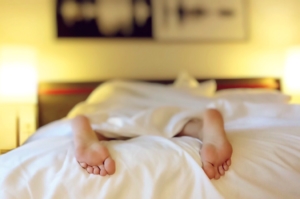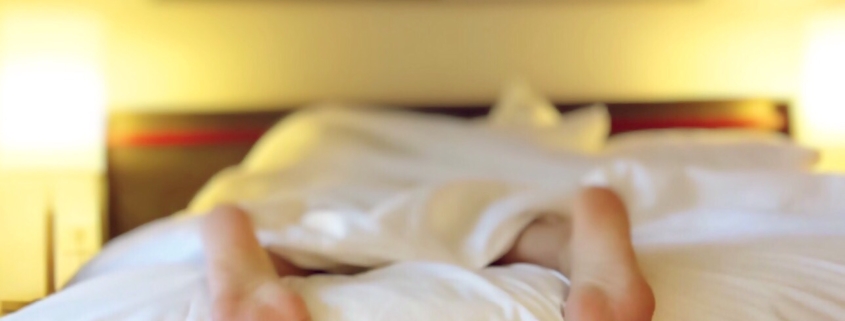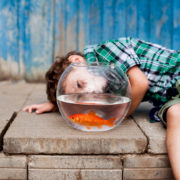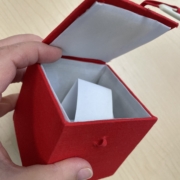Word. This is the number one anxiety related sleep issue I hear about: “I wake up and can’t get back to sleep.” That is closely followed by: “I can’t get my monkey mind to stop at night when I am trying to get to sleep.” I am going to help you with both issues. It’s up to you to actually implement the help. Horses, water, drink…well you know the drill.
First we are going to get the blah, blah, blah, sleep hygiene talk out of the way. You have heard it all before, BECAUSE IT’S IMPORTANT, duh. If you can’t get these principles under wraps, you may as well stop here, even if I am going to give you some mostly secret knowledge later on.

Here Goes…The Blah, Blah, Blah Sleep Hygiene List
- The vast majority of people need between 7-9 hours sleep per night. Period.
- Your room needs to be dark, cool, and distraction free. Get the pile of past due bills out of there.
- Get a decent mattress for heaven’s sake. And whatever kind of sheets make you feel comfy.
- No screens an hour before bedtime. The blue light they emit inhibits melatonin production, which you need for sleep.
- No going to sleep in front of the TV. The light can and will penetrate your (very thin) eyelids and signal your brain to produce “Hey buddy, it’s time to wake up hormones.” The nap you took will then interfere later on with getting good REM sleep—the most restorative deep-rest portion of sleep.
- Have a predictable bedtime routine. One that tells your snugalicious body “Ohhh goody! She wants us to go to bed and rest now.” That routine might include a warm caffeine-free drink, a good read, and your bathroom ablutions.
- Use your bed for sex and sleep only.
- And ditch the caffeine from noon on.
That Evil Middle Of The Night Waking
Middle of the night waking is not cause for panic. When this happens to you, just go with it. I tell clients to have a list handy of little, mindless projects to complete. Things that do not require your full-on brain power, but instead are kind of relaxing. Straighten your junk drawer. Make a menu plan. Look up a new recipe to make and create a grocery list. Write a letter with an actual pen and paper to someone you care about. Draw, color, read a real book.
When you wake at 2AM, don’t panic, just go with it. You will make it through the next day and the built up sleep pressure means you will sleep well the next night.–Page Rutledge, LCSW
There is an evolutionary reason that we sometimes have spells of acute insomnia. (That means it doesn’t last forever.) Acute insomnia typically lasts between three nights or more in a week to less than three months (Perlis 2018), and is a normal occurrence for humans. When early humans believed a bear or an enemy might attack in the middle of the night, their defense would hinge on the ability to stay alert. Today we do not live in this kind of peril, but our bodies react the same whether our threat is perceived or real. When under threat, you need time to figure out what to do and staying awake buys you that time. The insatiable 24/7 news maw doesn’t help either. Now we know instantly when local or world disasters occur, and the hits just keep on coming. So today’s insomnia really does masquerade as a false need for time that fools us.
When you have acute insomnia, and one study showed that 100% of Americans over a four period experience this, do nothing. I repeat, do nothing. When you try to compensate, you end up creating a mismatch between when you can sleep (sleep opportunity) and whether (sleep ability) you can sleep. Just let the sleep pressure rise and you will naturally cycle out of your insomnia. If it is taking you six hours to get eight hours of sleep, then you need to move your bedtime later. And don’t kid yourself that falling asleep during the day doesn’t count.
Build Sleep Pressure
DON’T lie in bed awake for hours. That turns your bed into a conditioned stimulus for wakefulness á la Pavlov’s dog. Get up and move to a different room to do the above suggestions until you feel sleepy again. So what if you’re awake longer. That will help build up sleep pressure so that tomorrow night you will sleep better. It’s best to take the overview of getting enough sleep over the course of a week vs allowing your anxiety over one night of lost zzz’s to freak you out. In general, most adults need between 7-9 hours sleep per night. The joke’s on you if you think those rules don’t apply to you. People who don’t get enough sleep are much more easily irritated, and have fewer emotional resources to manage what comes their way the next day. It also has the tendency to make you withdraw, which can devolve into self isolation, an even bigger problem than lack of sleep that can lead to depression.
Good Sleep
Good sleep helps us take out the day’s mental garbage. Literally. It restores activity in the prefrontal region of the brain for effective emotional regulation. Lack of sleep actually interferes with regions of the brain that support understanding of another’s intent. This means you too easily interpret wrongly, and misfires in communication, especially at work, can really hamper your career progress. People just like you better when you are well rested. It is also important to rule out other medical conditions that cause insomnia, like restless leg syndrome or sleep apnea. If you need help, the American College of Physicians recommends CBT-i, cognitive behavioral therapy for insomnia. This would include behavioral interventions, sleep hygiene, tracking your current habits, sleep restriction and stimulus control. I can help with this; contact me here if you’re ready.
One Last Tip
I advise clients to do a what I call a ‘brain dump’ before going to bed. Keep a notepad by your bed, and when your monkey mind starts up, jot down every single thing that is worrying you. Make a list. Don’t write a novel. Bullet points will do. Dump out those worries. Whatever they are, it will keep until tomorrow. Then get some good zzz’s. Good sleep to you.
Resource: This post is a partial summary, plus a few more of my bits from The New Science of Sleep, Psychology Today, June 2019.











